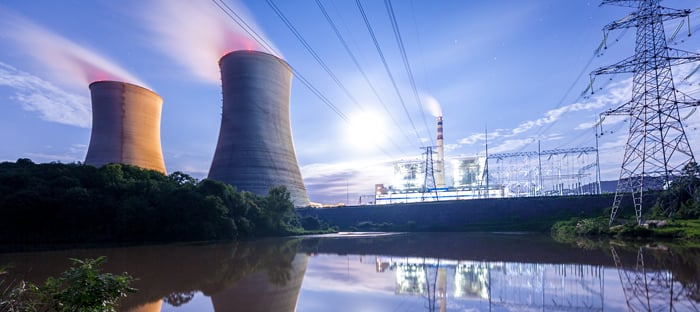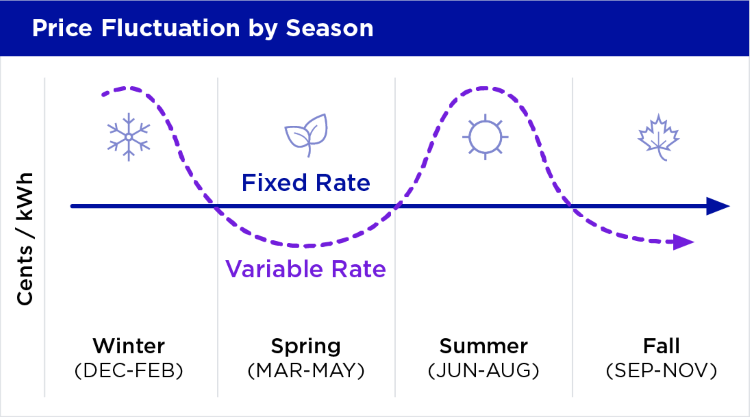Power your home
Enjoy price security with Safe Harbor fixed price energy plans

Power your business

Loading component...
Loading component...
Energy Resources

If you’re feeling the pinch of soaring energy prices, you’re not alone. Recent global events have exacerbated already rising electricity markets – registering a record 5.6% increase in prices in 2021 alone, according to the Global Energy Institute, and were expected to rise another 2.4% in 2022.
Supply chain challenges and market fluctuations have contributed to a historic drop in consumer spending overall, and opening the monthly electric bill is starting to feel a bit like receiving test results from your doctor. “Give it to me straight, Doc,” you might think. “Is it good or bad news?”
You’ll be happy to hear the news is good. Consumers can take steps to shield themselves from the inconstancy of global energy markets, and one of the simplest ways to do so is to choose a fixed-rate energy plan.
Fixed-rate electricity plans aren’t for everyone, however. The question is, is a fixed-rate plan right for you?
Chances are you know a bit about fixed and variable rates. The two terms come up a lot if you’re investing in a new home or buying a car and have everything to do with loan interest.
Those who choose a fixed-interest rate loan pay the same throughout the life of the loan. Those who choose a variable interest rate loan might see their monthly payment rise and fall - $300 this month, $500 the next – until the loan is paid in full.
The same holds true for fixed-rate and variable-rate energy plans, though energy rates are based on energy markets rather than financial ones. Energy prices go up? If you’ve got a fixed-rate plan, you’ll pay the same each month for each kilowatt hour (kWh) you use. If you have a variable-rate plan, you should make some room in your personal budget to compensate for market fluctuations.

Here’s the thing, though. A fixed-rate plan doesn’t guarantee your energy bill will be the same every month. That’s one of a handful of often misunderstood myths about fixed-rate energy plans, and you can make the best energy choice only if you have the most accurate information available.
Let’s dig in and find the truth about fixed-rate and variable-rate plans.
False:
This is a common misconception. When you choose a fixed-rate plan, you are locking in the cost of electricity per kWh, or a fixed electricity price. That price remains the same throughout the life of your contract, often 12 months or 24 months. Some gas and electricity suppliers, like Energy Harbor, even extend that through 48 months.
Your electricity bill may still fluctuate a bit month-to-month, but it will be more predictable and easier to budget because you won’t have to worry about overall market fluctuations. Reasons your total due may change include using more kilowatt hours from one month to the next or your utility company charging a different rate for one of its services.
One solution is to combine a fixed-rate energy plan from your supplier with a budget billing plan from your utility. Your fixed-rate plan will keep your kWh cost the same, and the budget billing plan will average out your yearly spending into equal monthly usage payments, and then true-up, or balance, your bill at the end of the year. That one bill may be more or less than your usual budget bill total.
True:
The biggest benefit of a fixed-rate energy plan is its stability. Market shifts, extremely hot or cold seasons, and so forth, will not change the fixed-rate plan’s kWh cost. However, for consumers who prefer frequent comparison shopping and want to switch plans and suppliers whenever energy rates change, this might seem like a risk to their preference.
If you want the stability of a fixed rate but the flexibility of a variable rate, then choose an electric supplier that doesn’t charge early termination fees, like Energy Harbor.
False:
Variable-rate plans are often attractive when comparing energy market prices. Initial price per kWh is typically lower than the fixed rate plans they are compared to.
The difference is that once the introductory rate expires – maybe a couple months later – the cost for your plan is subject to market volatility. If rates climb, your fixed-rate plan will likely be cheaper in the long run.
True:
If your electric supplier offers clean energy plans, then it can help lower your carbon footprint.
Clean energy refers to energy produced with little to no greenhouse gas emissions. This includes low-carbon and carbon- free energy sources such as wind, solar and nuclear. Nuclear energy is the largest non-fossil fuel electricity generation source in the United States.
False:
Choosing a fixed-rate plan over a variable-rate plan is an individual choice. Variable rate consumers enjoy the flexibility they offer in terms of switching plans when energy prices change.
It can require a bit more vigilance if the customer’s goal is to save money in the long run, however. Market changes can happen daily and factors like seasonality and demand on the grid can change the cost per kWh regularly.
In short, with a variable-rate plan, consumers have a bit more control over their energy rate, but less control over their monthly electricity bill – and that works for many people. Fixed-rate customers pay an agreed upon energy rate over a longer period and enjoy a more predictable bill.
False:
Energy rates are too unpredictable. There are many factors that can affect change, and an average energy customer likely wouldn’t have the time to cull that information and make an educated guess as to changes in the energy market. That makes a variable-rate plan a bit more unpredictable than most expect.
It might be a good option, though, for those that prefer no contracts or if you don’t have time to compare prices and need something short-term until you can do so.
Ready to find the best electricity rates and energy plan that works for you? When you switch your energy supply to Energy Harbor, we take the worry out of fluctuating energy prices. Weather the seasonal fluctuations in energy prices by securing the same affordable rate for years, and you will enjoy peace of mind with dependable energy costs in your electric bill.
Enter your zip code to see energy plans in your area.